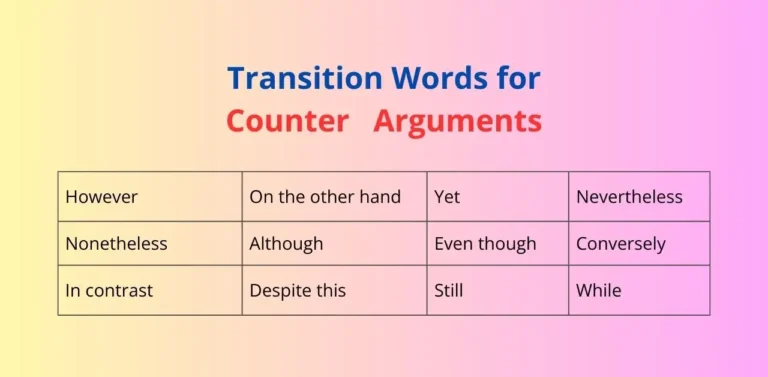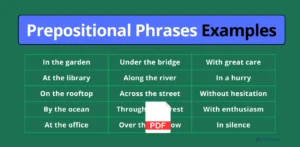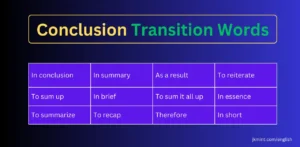In the world of persuasive writing, an effective counterargument can be a powerful tool. However, to make your counterarguments compelling, you need more than just a strong point of view. You need the right transition words to smoothly and convincingly convey your opposing perspective.
In this blog post, we’ll explore the essential transition words that can help you present counterarguments effectively.
The following comprehensive table includes a wide range of transition words and phrases for counterarguments, providing you with a valuable resource for improving your writing and argumentation skills.
| However | While | Yet | Nevertheless |
| Nonetheless | Although | Even though | Conversely |
| In contrast | Despite this | Still | On the other hand |
| Yet again | In spite of | Regardless | All the same |
| Even so | In any case | That said | Be that as it may |
| On the contrary | In any event | Notwithstanding | In reality |
Whether you’re a student looking to improve your essays or a writer aiming to make your point more effectively, mastering these words is a game-changer.
Also Read: Transition Words to Start a Paragraph
Explanation of Transition Words for Counter Arguments
Here are brief explanations and real examples for each of the transition words and phrases for counterarguments:
| Counter Argument Transition Words/Phrases | Usage |
|---|---|
| However | To introduce a contrasting point. |
| Regardless | It emphasizes the importance of an opposing viewpoint |
| On the other hand | Signaling an opposing perspective. |
| Yet | Indicating a conflicting idea. |
| Nevertheless | Showing a counterpoint despite the main argument. |
| Nonetheless | Similar to ‘Nevertheless,’ highlights a contrary view. |
| Although | Introducing an opposing viewpoint. |
| Even though | Emphasizing a contrary opinion. |
| Conversely | To present an opposing thought. |
| In contrast | Regardless of the main argument, it presents an opposing thought. |
| Despite this | Showing an unexpected or conflicting aspect. |
| Conversely | Indicating a different or opposing perspective. |
| Still | To emphasize the opposing view. |
| While | To draw attention to a contrary argument. |
| Yet again | Reiterating the presence of an opposing idea. |
| In spite of | To introduce a counterargument despite a prevailing idea. |
| All the same | Indicating a contrasting perspective. |
| Even so | To present a counterpoint in the face of the main argument. |
| In any case | Suggesting that the counterargument holds merit. |
| That said | Signaling an opposing view that should be considered. |
| Be that as it may | Acknowledging a counterargument’s validity. |
| On the contrary | To introduce a contrasting idea. |
| In any event | Regardless of the main argument, it presents an opposing thought. |
| Notwithstanding | Emphasizing that the counterargument is important. |
| In reality | Highlighting a different perspective that contradicts the main idea. |
| By the same token | Suggesting that the opposing view is equally valid. |
1. However
Explanation: Used to introduce a contrasting point.
Example: The weather forecast predicted a sunny day; however, it started raining heavily in the afternoon.
2. Regardless
Usage: “Regardless” emphasizes the importance of an opposing viewpoint or factor that shouldn’t be ignored.
Example: Regardless of the rain, they went hiking, highlighting the significance of their determination despite unfavorable weather conditions.
3. On the Other Hand
Explanation: Signaling an opposing perspective.
Example: Many people enjoy the convenience of online shopping. On the other hand, some prefer the in-store shopping experience.
4. Yet
Explanation: Indicating a conflicting idea.
Example: She had a busy schedule, yet she managed to complete all her assignments on time.
5. Nevertheless
Explanation: Showing a counterpoint despite the main argument.
Example: The movie received mixed reviews; nevertheless, it attracted a large audience.
6. Nonetheless
Explanation: Similar to ‘Nevertheless,’ highlighting a contrary view.
Example: He was tired; nonetheless, he stayed up late to finish the project.
7. Although
Explanation: Introducing an opposing viewpoint.
Example: Although he was skilled, he didn’t win the competition.
8. Even Though
Explanation: Emphasizing a contrary opinion.
Example: Even though it was expensive, she decided to buy the designer dress.
9. Conversely
Explanation: To present an opposing thought.
Example: Some people prefer summer vacations; conversely, others enjoy winter getaways.
10. In Contrast
Explanation: To compare and contrast opposing ideas.
Example: In contrast to her brother, she preferred tea over coffee.
11. Despite This
Explanation: Showing an unexpected or conflicting aspect.
Example: Despite his age, he performed exceptionally well in the race.
12. Still
Explanation: To emphasize the opposing view.
Example: He failed the first test, but he still believed he could improve.
13. While
Explanation: To draw attention to a contrary argument.
Example: While some argue for stricter regulations, others advocate for more flexibility.
14. Yet Again
Explanation: Reiterating the presence of an opposing idea.
Example: The company faced financial challenges, yet again, this year.
15. In Spite of
Explanation: To introduce a counterargument despite a prevailing idea.
Example: In spite of his fear of heights, he climbed to the mountain’s summit.
16. All the Same
Explanation: Indicating a contrasting perspective.
Example: All the same, he chose to pursue a career in music, despite his engineering degree.
17. Even So
Explanation: To present a counterpoint in the face of the main argument.
Example: The car was expensive; even so, it had excellent fuel efficiency.
18. In Any Case
Explanation: Suggesting that the counterargument holds merit.
Example: He was late for the meeting, but in any case, his proposal was well-received.
19. That Said
Explanation: Signaling an opposing view that should be considered.
Example: The restaurant is known for its spicy dishes. That said, they also offer mild options for those who prefer them.
20. Be That as It May
Explanation: Acknowledging a counterargument’s validity.
Example: Be that as it may, the research findings cannot be ignored.
21. On the Contrary
Explanation: To introduce a contrasting idea.
Example: Many believed the plan would succeed. On the contrary, it faced numerous challenges.
22. In Any Event
Explanation: Regardless of the main argument, presenting an opposing thought.
Example: In any event, the safety of the passengers must be the top priority.
23. Notwithstanding
Explanation: Emphasizing that the counterargument is important.
Example: Notwithstanding the budget constraints, the project must be completed on time.
24. In Reality
Explanation: Highlighting a different perspective that contradicts the main idea.
Example: In reality, the situation is more complex than it initially seems.
25. By the Same Token
Explanation: Suggesting that the opposing view is equally valid.
Example: By the same token, we should also consider the benefits of remote work.
These transition words and phrases can enhance the coherence and persuasiveness of your writing by effectively introducing counterarguments.
Also Read: Words with Deep Meaning
Conclusion:
In conclusion, mastering transition words for counterarguments is a valuable skill for anyone engaged in debates, essays, or discussions.
These words and phrases provide clarity, coherence, and balance to your writing and speaking. They ensure that your counterarguments are presented effectively, making your overall argument.
These simple yet powerful tools can transform your essays, making them more convincing and well-rounded.




